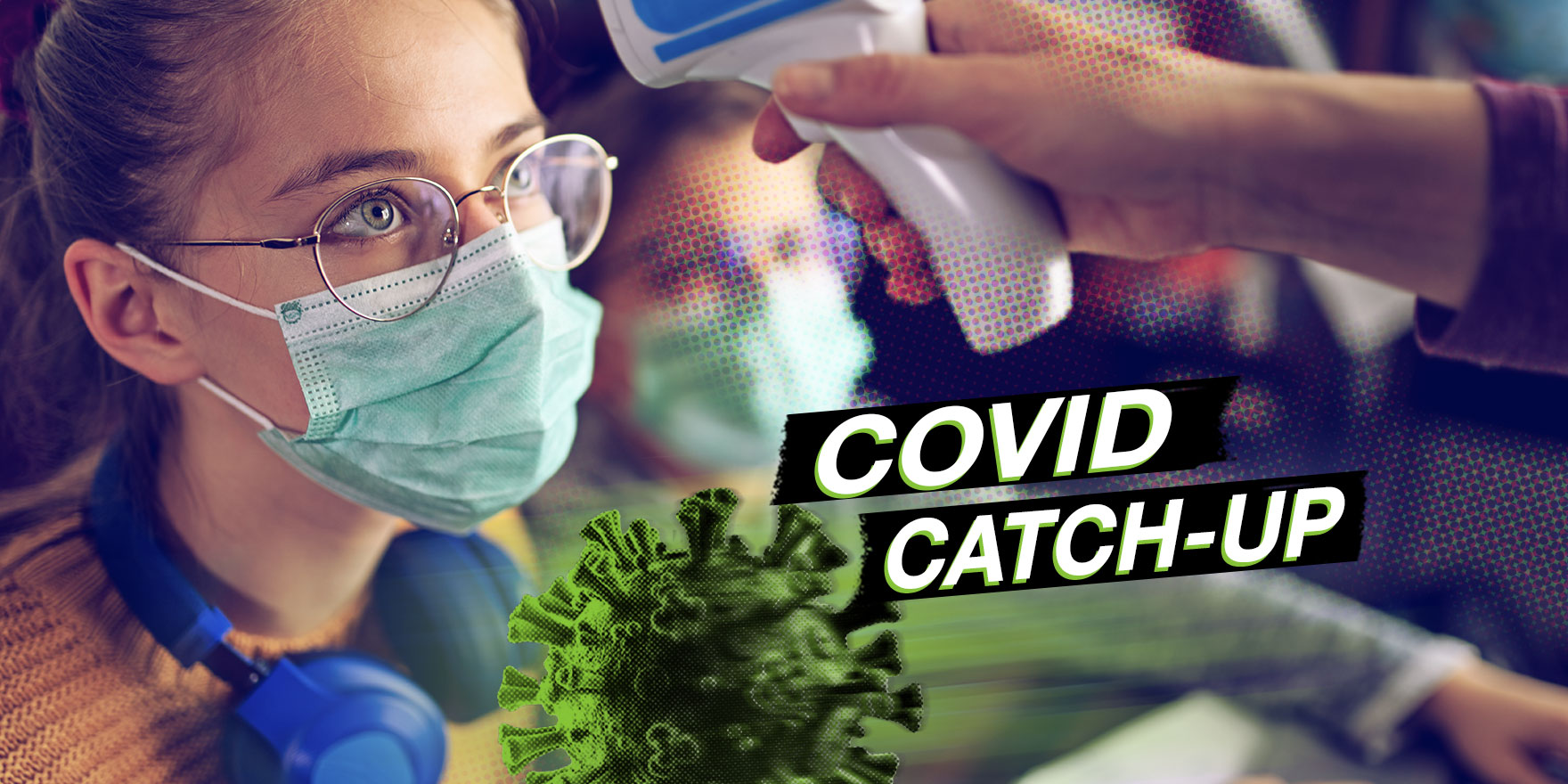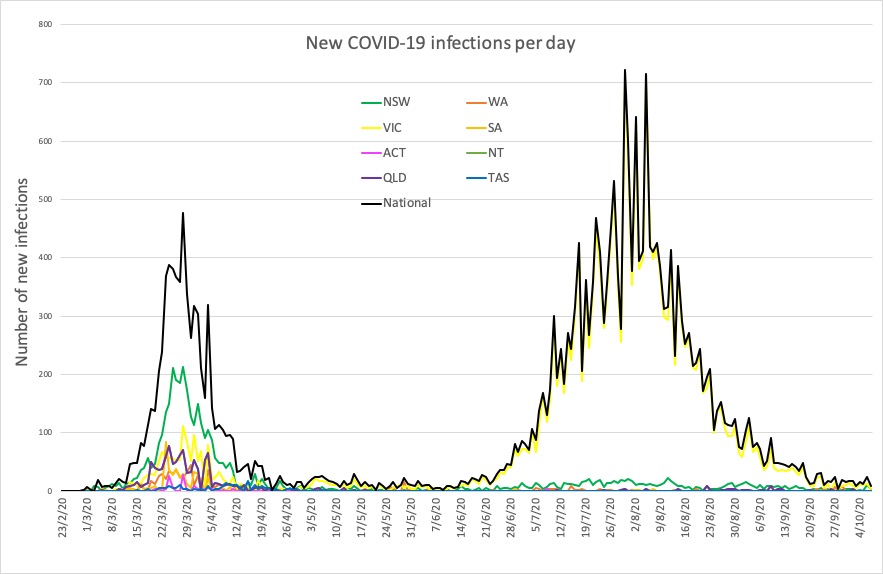The number of screening mammograms performed in Australia during the first peak of COVID-19 was around 70 times lower than performed in the month prior or two years prior.
Welcome to The Medical Republic’s COVID Catch-Up.
It’s the day’s COVID-19 news in one convenient post. Email bianca@biancanogrady.com with any tips, comments or feedback.
8 October
- Screening mammograms declined drastically during first COVID-19 peak.
- Study warns of remdesivir resistance.
- NEJM editorial slams Trump administration’s COVID-19 response as ‘dangerously incompetent’.
- Nearly half of Australians have experienced psychological distress during pandemic.
- UK study suggests three-quarters of people who test positive for SARS-CoV-2 are asymptomatic.
- Latest confirmed COVID-19 infection numbers from around Australia.
- The number of screening mammograms performed in Australia during the first peak of COVID-19 was around 70 times lower than performed in the month prior or two years prior, according to new data from the Australian Institute of Health and Welfare.
The AIHW has released a report examining the impact of the COVID-19 pandemic on cancer screening, which showed that just 1100 screening mammograms were performed in April 2020, compared to more than 70,000 in March 2020, and 74,000 in April 2018.
BreastScreen services were temporarily suspended from late March until late April/early May to protect staff and patients from COVID-19. By mid-May, restrictions had eased and the number of screening mammograms increased, reaching around 70,000 in June – which was still around 10,000 lower than the same period two years ago.
In total, 145,000 fewer mammograms were performed in the first half of 2020 compared to the first half of 2018, the report found.
Researchers also looked at the impact on bowel cancer and cervical cancer screening, but were unable to draw firm conclusions. While the cervical cancer screening program showed a reduction in the number of screens done, this may also have been influenced by the recent shift from a two-yearly screen to a five-yearly screening. The report’s authors also said the data on bowel cancer screening was complicated by program changes, and more long-term data was needed to see if any pandemic-related trends would emerge. - Evidence from the study of remdesivir as an experimental treatment for Ebola suggests that resistance could develop in SARS-CoV-2, researchers warn.
A paper published in PNAS details a single-point mutation in the Ebola virus that reduced its susceptibility to the broad-spectrum antiviral. This same molecular region is also found in the coronavirus family, including SARS-CoV-2, the study found.
“Given the ongoing clinical evaluation of remdesivir to treat COVID-19, SARS-CoV-2 sequences from remdesivir-treated participants should similarly be monitored,” the authors wrote. - Another leading medical journal has called out the Trump administration for its ‘consistently inadequate’ response to the COVID-19 pandemic, and asked the American people to render judgement at the ballot box.
The editors of the New England Journal of Medicine didn’t pull their punches. “Anyone else who recklessly squandered lives and money in this way would be suffering legal consequences,” they wrote. “When it comes to the response to the largest public health crisis of our time, our current political leaders have demonstrated that they are dangerously incompetent.”
Titled ‘Dying in a leadership vacuum’, the editorial pointed to failures such as the high infection and death rate from COVID-19 in the United States – both the highest globally – as well as poor testing and the lack of basic PPE both for healthcare workers and the general public.
They also criticised the politicisation of the pandemic response, and leaders’ decision to “ignore and even denigrate experts”, thus squandering the US’s enormous advantages in terms of advance biomedical research capabilities and expertise in areas such as public health. - Nearly half of Australians have experienced some degree of psychological stress during the COVID-19 pandemic, with women more affected than men, according to a survey published in the International Journal of Social Psychology.
The online survey, conducted during April 2020, used a 22-item questionnaire designed to assess the psychological impact of public health crises such as infectious disease outbreaks. Of the 1,495 adults who completed the survey – around 80% of whom were female – 47% reported at least one form of psychological distress; one-third of women and one-fifth of men reported moderate to severe levels of depression, 27% of females and 10% of males reported moderate to severe levels of stress, and 21% of females and 9% of males reported moderate to severe levels of anxiety. - A UK population-based study has found around three-quarters of individuals who tested positive for SARS-CoV-2 were asymptomatic at the time of testing.
The study, published in Clinical Epidemiology, used data from a survey of households across England, which tested 36,061 individuals for SARS-CoV-2 and found 115 (0.32%) were positive. Of these, three-quarters were asymptomatic on the day of the test, and less than half a percent had specific COVID-19 symptoms at the time of testing.
“The results of our study suggest that COVID-19 symptoms are a relatively poor marker of SARS-CoV-2 infection,” the authors wrote. - Here are the latest confirmed COVID-19 infection figures from around Australia, to 9pm Wednesday:
National – 27,182, with 897 deaths
ACT – 113 (0)
NSW – 4249 (3)
NT – 33 (0)
QLD – 1160 (0)
SA – 472 (0)
TAS – 230 (0)
VIC – 20,237 (6)
WA – 688 (1)



